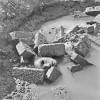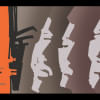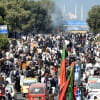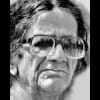Oh Pakistan!
What do you make of Pakistan's claim that they didn't commit war crimes? I asked my father. They mean they killed people but it wasn't criminal to do so, he laughed. And so did I. But we both knew that even though it sounded like a joke, and it was delivered like a joke, and we laughed like it was a joke, it really was not a joke.
Recall the stories that were told by Pakistani soldiers, Alam and Amin, who Yasmin Saikia interviewed for her book. Recall two ideas that the interviews revealed: 1) that "they refused to accept that what happened in East Pakistan was wrong, and even worse, still pretend that violence never happened there" even when narrating their own involvement in ordering mass killings, such as the killing in Santahar railway station; and 2) "…they made violence during war look like it was a normal thing… they talked about violence in a normal, matter-of-fact way to explain they performed duty that was required of them as military administrators" (p.220).
Recall Bina D'Costa's paper where she revealed that the Pakistan Army men felt justified in raping Bengali women to create pure Muslims by impregnating the women they raped.
Recall Tareq Fatah's comment: "The day Pakistan surrendered, 6 of us cried because we lost our brothers in Bangladesh, but everyone else [in Pakistan] laughed saying 'Bhuka Bangali Maar Gaya'." Recall how he expressed disdain towards Pakistan, being a Pakistani, for justifying rape and killing of uncountable Bengali men and women in 1971.
It is really not a surprise that Pakistan would make a statement which pretty much echoes what the research has been revealing all along: that Pakistan justifies the war crimes; that Pakistan will not take responsibility for the harm they inflicted on an entire people in 1971. Part of the reason is, perhaps, pride interlaced with guilt.
But there is another reason for which Pakistan may never apologise, and that is: they conceptualise those events in 1971 very differently from us. To us, in Bangladesh, it was our war of independence. To them, it was a war waged by secessionists. To us, they killed our men and raped our women. To them, they killed and raped men and women who were against the Pakistani state. To us, they were oppressors. To them, we were an inferior race. If you ask a randomly selected citizen of Bangladesh, s/he is mostly likely to tell you that the entirety of West Pakistan was complicit in the genocide of the Bangali people in 1971. If you randomly selected a citizen of Pakistan, s/he is most likely to say that in 1971 the Army was dealing with an external threat from India. Just the way textbooks in Bangladesh change every time a new Head of State takes power, textbooks in Pakistan have changed over and again revealing versions of the 1971 war that was far removed from what actually happened in 1971. So, now, some forty odd years later, we have a generation of Bangladeshis who still would like an apology from Pakistan, and a generation of Pakistanis who still don't know why (and have perhaps stopped caring).
But do we really want an apology? And if we ever get one, will we be able to forgive?
One might argue that there has been a shift in the climate for forgiveness given the withdrawal, if you will, of the institutionalised support that local war criminals have received in the past. With legal resolution, one might argue, comes a space in which forgiveness may occur. But are we willing?
Three considerations: One. I think it would be a different story if war criminals, including the ones in Pakistan, accepted their role in the genocide that they planned and executed. It's only when perpetrators accept what they have done and take responsibility for the atrocities they have committed that there can be a legitimate space for forgiveness.
Two, it may depend on the extent to which the trauma of the war has been dealt with. Based on interviews I conducted with genocide survivors in Bangladesh, I can say that most people still bear marks of the trauma that they experienced, they still get angry and upset when reminded of the war and the oppression they experienced. And thanks to the lack of support for individuals experiencing such trauma, both individually and institutionally, we have a generation that experienced first-hand trauma, and a second generation that experienced second-hand trauma as a result of their parents' trauma experiences. And so the question arises: When remnants of trauma remain, is forgiveness a viable option?
Finally, it depends on how we conceptualise our war of independence. Do we think of it as an act against humanity (i.e. it's not personal) or do we think of it as atrocities committed against Bengalis (i.e. it is personal). Research by Wohl and colleagues suggest that personal atrocities are harder to forgive, even when an apology is made, and my personal opinion is that we in Bangladesh have conceptualised the war as a personal affront, which means, we will probably never be able to forgive Pakistan for the atrocities.
But it is still worth trying. For our own sake than anyone else's.
As for Pakistan, I just have one question, because I'm not sure they completely understand what "war crimes" mean and because it's perhaps worth knowing: What exactly are you denying?
The writer is Assistant Professor at the School of Social Work, University at Buffalo.

 For all latest news, follow The Daily Star's Google News channel.
For all latest news, follow The Daily Star's Google News channel. 








Comments